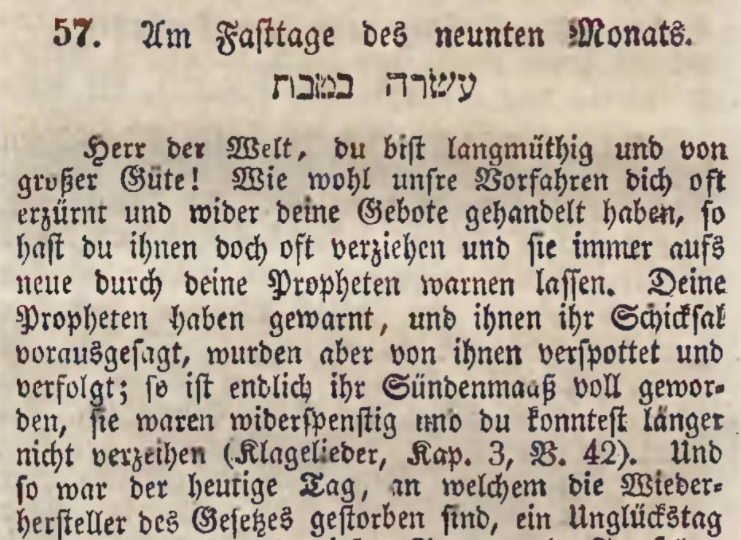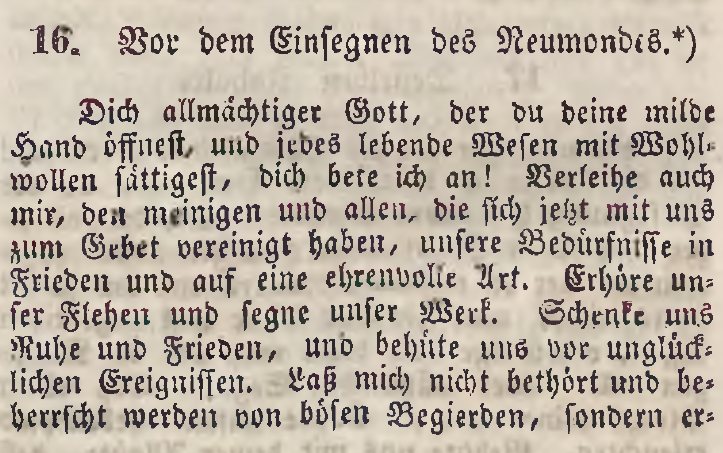| Source (German) | Translation (English) |
|---|---|
Am Todestage des Gedaljahu.[1] Am zweiten Tag des Monats Tischri, oder für uns den Tag nach dem Neujahr, siehe Anhang. Ẓom Gedalja. | |
Mit inniger Betrübniß gedenken wir heute an die Zeit wo unsere Vorfahren durch Nebukadnezar König von Babylon unterjocht, und meistentheils aus ihrem Lande vertrieben worden sind. Allgerechter und gütiger Gott, du hast uns dein Wort durch die Propheten aufbewahrt. damit wir lernen wie dir gehorchen Leben und Seligkeit ist; wie jeder Abfall von deinen Geboten, jede Widerspänstigkeit wider die, die in deinem Namen lehrer, Sünde ist und Unglück erzeugt. |
With deep sadness we remember today the time when our ancestors were subjugated by Nebuchadnezzar, king of Babylon, and mostly driven out of their country. All-just and gracious God, you have preserved your word for us through the prophets, so that we may learn how obeying you is life and salvation; how every apostasy from your commandments, every rebellion against those who teach on behalf of your name, is sin and produces misfortune. |
Der fromme Gedaljahu, der nach den Lehren des Propheten Jeremias, unsere Vorfahren belehrt hat, in ihrem Lande zu bleiben, und den Gesetzen des Eroberers zu gehorchen, bis ihnen das Erbarmen Gottes bessere Zeiten herbeiführen werde, wurde ein Opfer der Wuth wilder Eiferer, die auf eigene Weisheit, auf eigene Kraft mehr Vertrauen setzen als auf Gott. Unzählig sind die traurigen Folgen jenes schrecklichen Verbrechens, und nicht ohne Einfluß auf spätere Geschlechter. Drum gieb o Gott, daß diese Erinnerung uns warnend vorschwebe, stets den Geboten deiner treuen Lehrer und ihrem Rathe zu gehorchen, stets treue Unterthanen der Obrigkeit zu sein, die über uns gesetzt ist. Denn nichts geschiehet ohne deinen Willen Herr und auch das kleinste Amt wird ohne deine Erwählung oder Zustimmung nicht ertheilt.[3] Talmud Traktat Berachot Fol. 58a. |
The pious Gedalyahu, who, according to the teachings of the prophet Jeremiah, instructed our ancestors to remain in their country and to obey the laws of the conqueror until the mercy of God would bring them better times, became a victim of the rage of wild zealots, who put more trust in their own wisdom, in their own strength than in God. Countless are the sad consequences of that terrible crime, and not without influence on later generations. Therefore, O God, grant that this reminder may be a warning to us to always obey the commandments of your faithful teachers and their counsel, to always be faithful subjects of the authority that is set over us. For nothing happens without your will, Lord, and even the smallest office is not granted without your election or consent.[4] Brakhot 58a |
Das Herz des Königs aber, ist wie Wasserbäche, du leitest es nach deinem Willen. So wirst du denn stets das Herz unserer Beherrscher zur Barmherzigkeit leiten, daß sie uns wohlthun. Amen. |
The heart of the king, however, is like a stream of water; you direct it according to your will. So then you will always guide the heart of our rulers to mercy, that they may do us good. Amen. |
“Am Todestage des Gedaljahu. Zom Gedalja.” was written by Yehoshua Heshil Miro and published in his anthology of teḥinot, בית יעקב (Beit Yaaqov) Allgemeines Gebetbuch für gebildete Frauen mosaischer Religion. In the original 1829 edition, תחנות Teḥinot ein Gebetbuch für gebildete Frauenzimmer mosaischer Religion, it appears as teḥinah №41, on pp. 52-53. In the 1835 and 1842 editions, it appears as teḥinah №40, on pp. 63-64.
The transcription presented here was derived by proofreading the output of Tesseract-OCR with its Fraktur script training data. We are extremely grateful to Dr. Andreas Rusterholz for his corrections.
The translation here was derived by proofreading the output of the translation tools of DeepL and Google. –Aharon Varady
Source


Notes

“Am Todestage des Gedaljahu. Ẓom Gedalja | [Prayer] on the Day of the Assassination of Gedalyahu (צוֹם גְּדַלְיָה), by Yehoshua Heshil Miro (1829)” is shared through the Open Siddur Project with a Creative Commons Attribution-ShareAlike 4.0 International copyleft license.










Translation please!